Ed
Foster is widely considered to be one of the most important independent publishers
of avant-garde poetry today. A former professor of American Studies in the College
of Arts and Letters at the Stevens Institute of Technology, he was born and raised
in a small village in the hills of western Massachusetts. Author of forty books
of poetry, criticism, biography, and literary history (and still counting), Foster
is the founder of Talisman House, Publishers, and the journal Talisman:
A Journal of Contemporary Poetry and Poetics.
His latest collection of poetry, Sowing the Wind: A Requiem in the Modern
World, has just been published by Marsh Hawk Press. This
interview occurred on 12 September 2016 in Ed’s living room in Northfield, Massachusetts,
overlooking the ancient shoreline
of Lake Hitchcock and the foothills of the Green Mountains.Rob Couteau: In your Jack
Spicer book, you say that Spicer “believed that poetry, like language, was communal
and ideally impersonal. The sublime self of Leaves of Grass was entirely
foreign to him. It was as if from the beginning Spicer had determined to see and
do everything the opposite of Whitman.” Could you talk about this
difference and these diverse directions or conventions in poetry? Ed Foster: It’s true that
Whitman and Spicer operate from different angles. If you’re looking for a nineteenth-century
predecessor for Spicer, it would be Dickinson. In fact, Spicer was very interested
in Dickinson, and he wrote a critical account of the Johnson edition of her work.
For a while, Spicer lived
in Boston, and some of Dickinson’s manuscripts are at the Boston Public Library,
where he worked, so he was able to see what they looked like. Thomas Johnson’s
variorum edition of Dickinson’s work came out in 1955, when Spicer was in Boston,
and he reviewed it for the library’s journal. Johnson’s edition stabilized punctuation,
replacing Dickinson’s dashes with periods and commas and so forth. These things
affect the reading, notably the sound. Spicer recognized this. He had many positive
things to say about Johnson’s work, but he differed with him on major points.
Johnson, for example, thought her dashes to be “especially capricious,” but Spicer,
with a poet’s attention to sound, found them to be important indicators “of stress
and tempo.” This attention to sound is critical to his own work. Another key thing is that
Spicer thought of himself as a Calvinist. He went to a Baptist school and had
been raised as a Baptist. He didn’t think of himself as a Calvinist in the New
England sense – the Congregational Church, and so on – but perhaps as closer to
a more conventional notion of Calvinism, traceable back to Geneva. Certainly,
he shared the darkness that one associates correctly with Calvinism.

ED
FOSTER, "SELF-PORTRAIT IN A BATHROOM MIRROR" | Also, in Spicer, you find
a precision: a sense of the individual word that is beyond ordinary human discourse.
It isn’t the spoken language; it has more to do with the inner workings of language.
After all, he was reared in a Calvinist tradition in which the Bible is understood
to be divinely inspired, so he would have learned to see words as far more than
culturally expressive. In Dickinson’s work, you find a parallel seriousness: an
attempt to reach, perhaps, a kind of scriptural language and truth that is more
than cultural observation. She wrestles with language such that it be more
than descriptive or denotative. So that, in both poets, you encounter a verbal
knowledge that transcends the personal and cultural and hence, I believe, transcends
the merely rhetorical. Now, let’s turn to Whitman.
Whitman is very interesting, but people don’t seem really to understand him. Sometimes
they say, “Well, he was creating a spoken language” and point out that, during
this time, English heard in New York was very different from English heard in
Boston. It still is. I mean, there’s a Boston accent and there’s a New York accent,
and it was much more pronounced back then. And Whitman was, after all, a New York
poet. But listen to this: “I celebrate myself and sing myself, and what I assume
you shall assume, for every atom belonging to me as good belongs to you.” Well,
that’s not actually spoken English, and there’s no place in the United States
in the nineteenth-century where you might have heard anyone speak like that, so
it’s nonsense to say that Whitman was a master of the spoken language, the vernacular.
So then, where does this language come from? There have been a number
of proposals over the years, and one that has a great deal of truth to it is opera,
opera being at that time something which was common in the way that films are
now. People went to the opera the way that people go to the movies now. Nor was
it a class thing; it’s a complete mistake to think that way. Then, as others have
pointed out, in Whitman, there are resonances of political speech: a kind of high
rhetoric. Also, diction such as you would have found in a church, with certain
kinds of preaching. Not surprisingly, there are also elements of journalism, for
he was a journalist by trade, after all. At any rate, Whitman’s
is a created and creative language; it is not a spoken language. By spoken language,
I mean a commonly spoken language. Whitman’s work is meant to be heard, but it’s
not the kind of language that was spoken on the street. I’m not criticizing it.
But I sense there’s a very different kind of effort in Whitman than in Dickinson,
and then in Spicer. It has to do, I think, with the
different levels of meaning and intent attained in their respective sensibilities.
Dickinson learned much
from hymns, from their language, their cadence, their structure – but not from
journalism, not from opera or politics. It’s interesting to compare her work with
hymns contemporary with her poems: Anna Walker’s “Work, for the night is coming”
(1861), for instance, or Sarah Flower Adams’ “Nearer, my God, to Thee” (1841).
These hymns are driven by an intense spiritual desire or need akin to that in
Dickinson. Although they’re driven by an uncompromised certainty, Dickinson can
also be compromised by doubt. But then, so was Calvin, so was Luther. Actually,
doubt and questioning are the source of much of her strength. Now, things become difficult
at this particular point, because, as I say, in both Spicer and Dickinson and
in scripture, you’re dealing with words that, at least in theory – and I would
say “in fact,” but I know that would be controversial, so we’ll stick with “in
theory” – may have a spiritual essence. Spicer’s language may have roots
in Rilke or in, say, Lorca’s duende and so forth, but this is quite different
from what one commonly finds in Whitman. There, one finds a rhetorical
origin. They are not the same thing. And so, with Spicer, you
have this notion that poetry comes from East Mars. That it’s nonintentional. I
think that’s been mistaken these days. It’s seen as somehow leading to kind of
a linguistic understanding of poetry that takes us into the language writing that
was so popular back in the 1980s. And I think that was always wrong; that was
always a misreading. With Spicer, language is not something that a poet controls;
the poet is controlled by it. And not merely in a social or political sense. One
highly reductionist argument claims that his language is essentially political.
That sounds to me more like Whitman, for whom poetic diction is the composite
of dictions in a uniquely Whitmanesque merge. Whitman is really claiming for himself
a kind of political high ground. He lectures. And that’s just not the same thing
as the free-seeking imaginations and linguistic anarchy possible in Dickinson
and Spicer, which are far beyond what the culture happens to be babbling. RC: You say “Thousands
of poems and books were written under [Spicer’s] tutelage and criticism. Richard
Brautigan’s Trout Fishing in America […] is probably the best known. Although
it is conventionally read as a novel, it is actually closer to a serial poem.”
I was wondering if you could expand upon that. EF: As I remember, the
serial poem goes back to the Berkeley Poetry Renaissance. That’s when Duncan,
Spicer, and Blaser met quite regularly, along with other poets. Duncan, I think,
at that time, was a student at Berkeley. I’m not sure if Spicer was doing his
doctoral work there yet. But they met regularly, and they would read poems and
write them. And they had reached a point where they collectively saw poetry as
being the firmest truth, the firmest knowing or conviction: gnosis, if you will.
At one of their meetings,
Duncan wrote, I believe, the sequence known as “Medieval Scenes.” And Spicer,
quite astonished by what he was seeing and hearing, thought it to be a way of
achieving poetry that was distinct from what people had conventionally done. Now, this gets a little
complicated. In the late 1940s, Rilke had become a poet critical to many in that
particular community in Berkeley. And Rilke is famous for the “Duino Elegies.”
Visiting at Castle Duino on the Adriatic, walking along the beach, he hears the
words: “Wer, wenn ich schriee, hörte mich denn aus der Engel Ordnungen?”
[Who, if I cried out, would hear me among the hierarchies of angels?] and so on.
And it is not composed. It is heard.
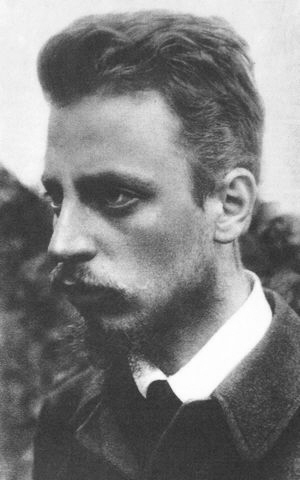
RILKE |
As I said, people were
very much aware of Rilke in the Berkeley community. Circle magazine, an
extremely important Berkeley journal of the time, published works about him. Spicer
writes his “Imaginary Elegies,” a clear reference to Rilke. There’s also a great
interest in post-Symbolists and poets such as Lorca, who advanced notions of poetry
not as composition but as language heard with a deeper spiritual resonance. And
in Lorca’s case, as the voice of the duende, the conte jondo. The
words come and they may have, you might almost call it, a kind of multiflora intensity,
as when you look at a rose and are overcome with joy. There are many different
blooms that are taking place at the same time. It’s an ecstasy, if you will. You
are transported into a realm of multiple things heard, voices heard. It has nothing
to do with understanding. I repeat, poetry of this sort has nothing to do with
understanding; that’s something for critics to figure out. And for me, that’s
just an evasion. No, it is something heard, and you are struck. The other thing to put
into this moment is the idea of feedback. It came out of science circa
1919, but you also find this in Proust. For example, the famous one is the madeleine.
That, after many years, Proust has the madeleine, and he dips it in the lime tea,
and all of a sudden there are memories; they flow back. Feedback is what Proust
is all about, and that’s feedback without having the name. Later on, Charles Olson
borrowed the term from Norbert Weiner’s Cybernetics, published in 1948.
It’s a term that is key to “The Kingfishers” and to Olson’s later work. So, Proust
has feedback, and this notion quickly became critical to poetry. It’s another
way of opening that multiflora intensity, that ecstasy. Again, you’re struck. I believe all these things
enter into Spicer’s notion of the serial poem. It is like juggling many things
at once. On the one hand, the serial poem is like a serial that you see in a movie.
You know, The Perils of Pauline, and you go every week, and there’ll be
another chapter. “Medieval Scenes” is constructed like that, but, as developed
by Spicer, the serial poem is intensely laden with feedback.
In other words, it’s not linear, but things that are mentioned in one particular
part of the sequence can reemerge here and there. And then a second emanation
becomes a kind of expansion of what happened earlier. And then a third. And on
and on. But you have to have an imagination that is able – and of course, we’re
all trained to think otherwise – to pick these things up. And to have a work that’s
constructed with a kind of multireference. And it’s going on in another dimension,
and it is ecstatic. Obviously, I’m not going
to put myself in the Spicer camp, yet I would say that’s how Sowing the Wind
is shaped. It is not linear. It’s absolutely Spicerian in this particular sense
that, ultimately, you need to have the whole work in your mind so that it will
transcend these trajectories that go beyond ordinary time. Past, present, future:
they are all there. Now. I believe every word in that book is exactly where it
should be. Every comma. Everything. But they work as parts of a whole and not
one that is merely linear. I was much affected by Liszt’s second piano concerto
with its violent shifts in tonality and tempo but done such that you can’t grasp
the third movement until you have fully absorbed the first, and the first encompasses
the third. RC: In your Brautigan
book, you say “over the years since 1945, [the American Northwest] has produced
several popular and respected novelists and poets, including Tom Robbins, Ken
Kesey, Philip Whalen, and Gary Synder. These writers share a fascination with
mystical, rather than objective or analytical, perceptions of experience [….]
They do not fit comfortably into any European-American literary tradition. They
seem, rather, iconoclasts, spiritual revolutionaries.” How would you characterize
the spiritual dimension of Trout Fishing in America? Would Zen Buddhism
be the tradition that it’s most reminiscent of? EF: Oh, yes; that’s certainly
there. But I think what I was just describing in terms of the serial poem … That,
by its nature, is an expression of spiritual essence, because it transcends the
conventions of an “x leads to y and only y” reasoned order. And what are you dealing
with there, since the world is constructed, we construct the world, in that fashion?
What you’re experiencing in a serial poem is that you’re really abolishing those
conventions. In attempting to understand what happens, you have to move into what
I would call a spiritual way of dealing with experience, with words. This is the Northwest,
it’s California, where Spicer is. In a New England setting you’ll find it in Dickinson.
Frost presents a different case. Frost is a deeply spiritual poet, but x always
leads to y. There’s an argument. Until suddenly … RC: Almost a didactic
quality? EF: Well, it isn’t really.
This is the way his mind seems to work. I think a great deal of Frost; he’s very
important to me. But it is a different kind of mind that is working: this leads
to this, leads to that. But then, he creates what you might call emblems.
All of a sudden, full stop, you are in a space beyond y, and there is joy. Whereas, if you’re dealing
with a Spicer text or a Brautigan book or whatever, then you could almost rearrange
the chapters and you’re going to have the same book.
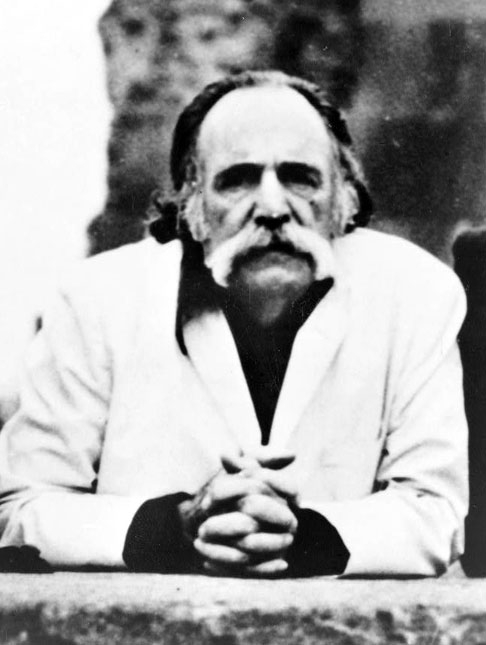
WILLIAM
SAROYAN | RC: And you feel that
Brautigan is an underappreciated writer. EF: I do, yes. Oh, absolutely. RC: In your book on William
Saroyan, you say that your friend, the poet Ted Berrigan, accompanied by Saroyan’s
son, Aram, interviewed Jack Kerouac for The Paris Review. Speaking of Saroyan’s
influence, Kerouac said, “Yes! I loved him as a teenager, he really got me out
of the nineteenth-century rut I was trying to study, not only his funny tone but
his great Armenian poetic I don’t know what … he just got me.” You also quote
from Michael Arlen’s essay, “Passage to Ararat.” Commenting on Saroyan’s “Five
Ripe Pears,” Arlen said “It was not an important story, but it was a lovely story
– a story with a voice. It made one think with a kind of pleasure that J. D. Salinger
must have heard that voice, and Richard Brautigan, and Jack Kerouac, and all those
writers of the personal sound.” I was wondering if you
could talk about the importance of the personal voice. Or, perhaps I should say,
not necessary “personal,” but the unique voice that comes through a person. EF: Yes, that is a problem
because, if you start talking about “personal,” then you’re going to talk about
God knows who, some confessional poets from the Sixties and Seventies, or people
who use poetry to preach their politics. Such as Whitman. RC: I don’t mean the voice
coming through the ego but rather the unique tone that resonates through
this vessel. EF: That’s right, yes.
Well, one way to think about this is to take a poet from the nineteenth century
like Tennyson. Tennyson sounds like Tennyson; nobody else sounds quite like Tennyson,
but this is achieved through the perfection of a poetic tradition. And he does
it in his own way. Whereas with people like Saroyan or with writers who can be
very Whitmanesque (in other words, those who belong to this school of combining
elements in the language in order to create a uniqueness), there’s nonetheless
an ability to speak in a way that is able to go beyond the conventions of ordinary
language discourse and to imply a presence in language that is a distinctive presence.
And, like Tennyson, like Whitman, it is rhetorical; yet, that’s where Kerouac
begins. But only begins. Then, the rockets begin to fire. Saroyan is completely
underrated today. The reason I wrote those books was to try to reinvoke some kind
of awareness of his remarkable prose. But I don’t think I got what I wanted. I
did another Saroyan essay that’s being published this coming year. Trying again.
He remains for me very, very important. I know there are problems. Yes, he can
be sentimental in an Armenian sense. And it is an Armenian sensibility.
I think that’s wonderful, but it does mean that, at times, a difficult emotional
problem is resolved sentimentally. I’m saddened by that, because it’s a kind of
cop out; it’s unfair. Because he can be so good. He can be so very
good. One of the best things about Kerouac is that, generally, he got beyond the
merely sentimental. He can be sentimental, too, but there isn’t that easy resolution
that you find sometimes in Saroyan. The whole Armenian thing
interests me very much. A lot. Because of living in Turkey and having a contact
with the Armenian poets there. Very important for me, and I translated a few Armenian
poems, years ago, as a result. One particular Armenian poet, one I worked on,
a guy named Zahrad, is similar to Saroyan in this sense. It’s not a conventional
American sound, and people who put Saroyan in a completely American lineage, I
think, miss the point. RC: In your wonderful
book, Understanding the Beats, you say “Confusing the writer with the subject
of On the Road, Kerouac’s early followers were surprised to find that he
did not even like to drive. They never understood that his real revolution had
to do with language.” “Spontaneous prose offered Kerouac the richest possibilities,
and at its best […] it made possible a complex, evocative prose unequaled in kind
by any of his contemporaries.” What is the relationship between Kerouac’s spontaneous
prose and gnostic poetry? EF: [Laughs] And how many
hours do we have? RC: You may have to condense
a bit! EF: Essentially, spontaneous
prose is gnostic, or it can be. I have certain problems with it, however.
For example, the whole notion of “first thought, best thought.” The first thought
may, in fact, not be the best thought, because you may mishear. That’s
why nothing should be released into the world as initially heard. What’s necessary
is to go back, repeatedly, and listen again, and listen again, and listen again.
Then, perhaps, after even thousands of listenings, finally, the word is going
to be what it is. RC: Would you agree that,
although Kerouac did underedit, nonetheless he did edit. If you look at
the original scroll of On the Road, there’s editing throughout the whole
thing. EF: Yes, there is editing,
and that’s fine if the editing is the result of listening. But there’s also his
editor Malcolm Cowley, who did a lot of editing, the real kind.
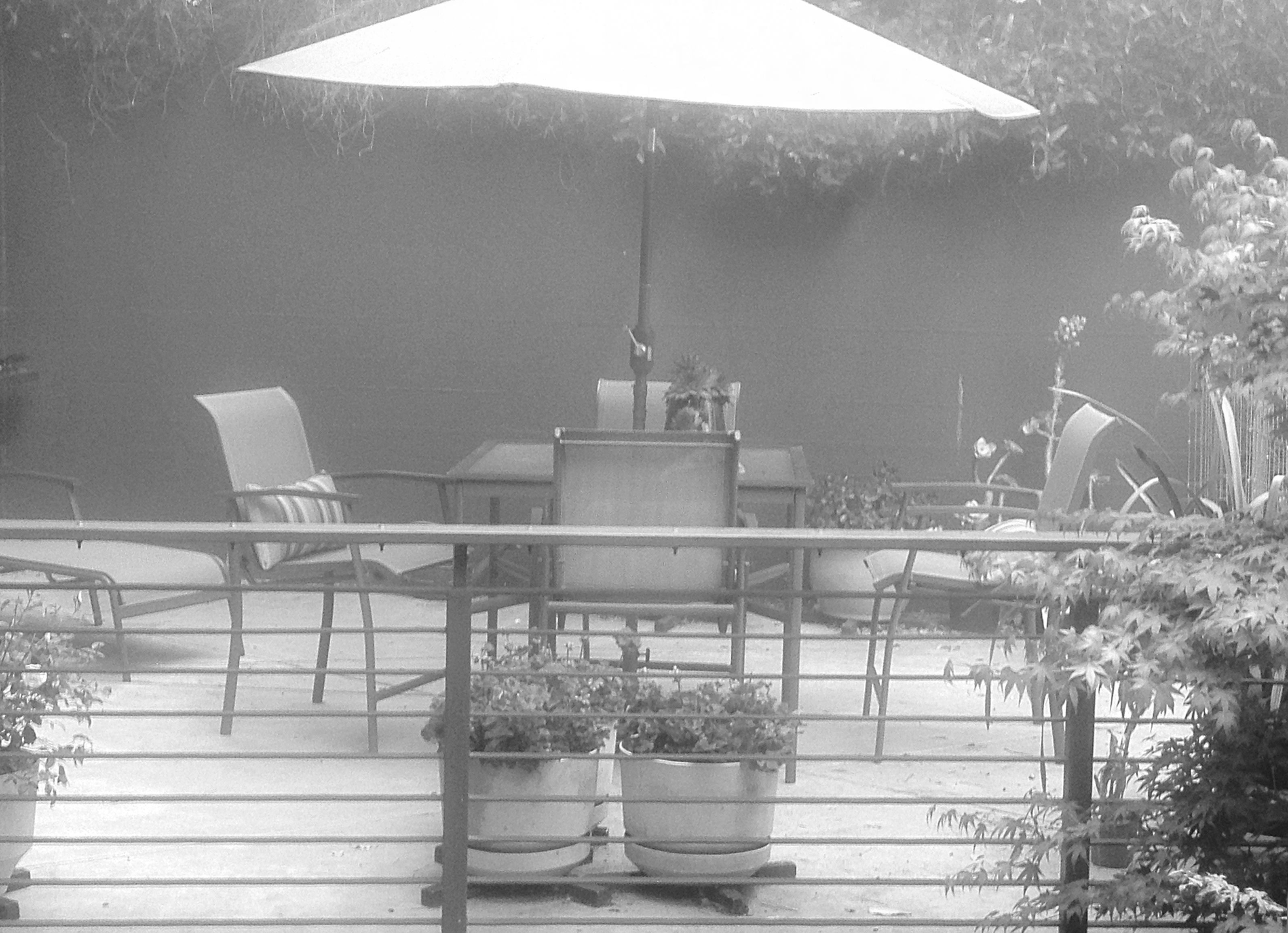
ONE
OF ED FOSTER'S PHOTOS
FROM SOWING THE WIND | RC: But Kerouac’s own
hand is on there, too. EF: He made his own adjustments,
yes, that’s right. But it is gnostic; that is what it is. RC: Is Whitman not gnostic? EF: No, I don’t think
so, for the reason I gave earlier. RC: So, for you, gnostic
is not just that you’re hearing the voice coming through you. It’s more than that;
it’s what you were describing before. EF: Yes, that’s right.
It’s a particular shape of knowing, dependent on listening, not thinking, not
composing. RC: One of Kerouac’s biographers
implies that the psychological dynamic behind Kerouac’s writing philosophy derives
from his premature exposure to death, which led Kerouac to try to preserve the
moment from corruptibility. Thus, you don’t edit much, because you want to preserve
this unique moment, captured in spontaneous prose, from change. Now, isn’t that
a bit far out? EF: [Laughs] Yes. Come
on! I mean, really, seriously! Needless to say, I enjoyed hearing what was going
on in Kerouac’s mind. But, at best, it’s what I guess is going on. RC: Isn’t this is a big
problem with both art historians and literary critics? That is, they assume that
they’re in the creator’s head and can explain everything in a linear way. EF: Yes. In fact, there’s
a really great case of that in a recent biography on Wallace Stevens. By the end
of the book, you might think that the only person besides Stevens himself who
was ever able to understand Stevens’ mind as a poet was the author, because he
knows what was going on, and … Please! No, come on. No. That kind of “insight”
is no insight, because you can’t know. You can’t know that. It’s only a guess.
And since it’s only a guess, maybe it’s not worth writing down. RC: Also, I think that
art is the greater frame. Psychology often assumes that it came frame everything,
but art transcends the frame of psychology. Psychology is within the frame
of art, not the reverse. EF: And I don’t think
that psychology need have anything to do with it. One of the nice things about
Hemingway is that he refused to be psychoanalyzed. Because that’s a system;
that’s not the truth. And you could be an Adlerian; you could be a Freudian;
you could be a Jungian, but that is a system! If you’re writing, you must remove
yourself from systems because, otherwise, you’re just going to bury your mind
in somebody else’s notion of order. RC: And neither psychology
nor literary criticism can deal properly with intuition … EF: No, it can’t. RC: … which is such a
major aspect of what we do, creatively. EF: Correct. RC: But they’re constantly
trying to apply thinking and logic to “explain” what is happening on a purely
intuitional level. You agree? EF: But then one might
ask, Well, what is intuition? RC: It’s a mystery. That’s
what I’m saying; it’s a mysterious process. EF: Yes. As soon as you
name an abstraction, an attitude, a process, or a feeling – which, alas, is what
I’ve been doing now – you no longer have the attitude, feeling, process, or abstraction.
That is a problem of language. RC: It’s like the first
line of the “Tao Te Ching”: “The way that can be named is not the true Tao.” EF: OK, good. Yes, fine.
The language that tries to pin things down and then define is essentially journalistic
and reportorial. And poetry is much more than that. RC: The books of the Beats
were somewhat prophetic about what was happening in America. You say that Burroughs’
Dr. Benway “is a behavioral psychologist in the employ of a fascist state. […]
He considers ‘brutality’ inefficient, preferring the generalized guilt which can
be induced in ‘free’ and decent citizens. Everyone has something to hide, and
all that one has to do is find what it is. Drugs, vague threats, sexual humiliation,
psychoanalytic suggestion, and other techniques can be used to reduce the citizen
to a state of cringing, guilt-ridden helplessness.” I thought this was frightfully
prophetic when one considers the NSA’s telephone and Internet surveillance …
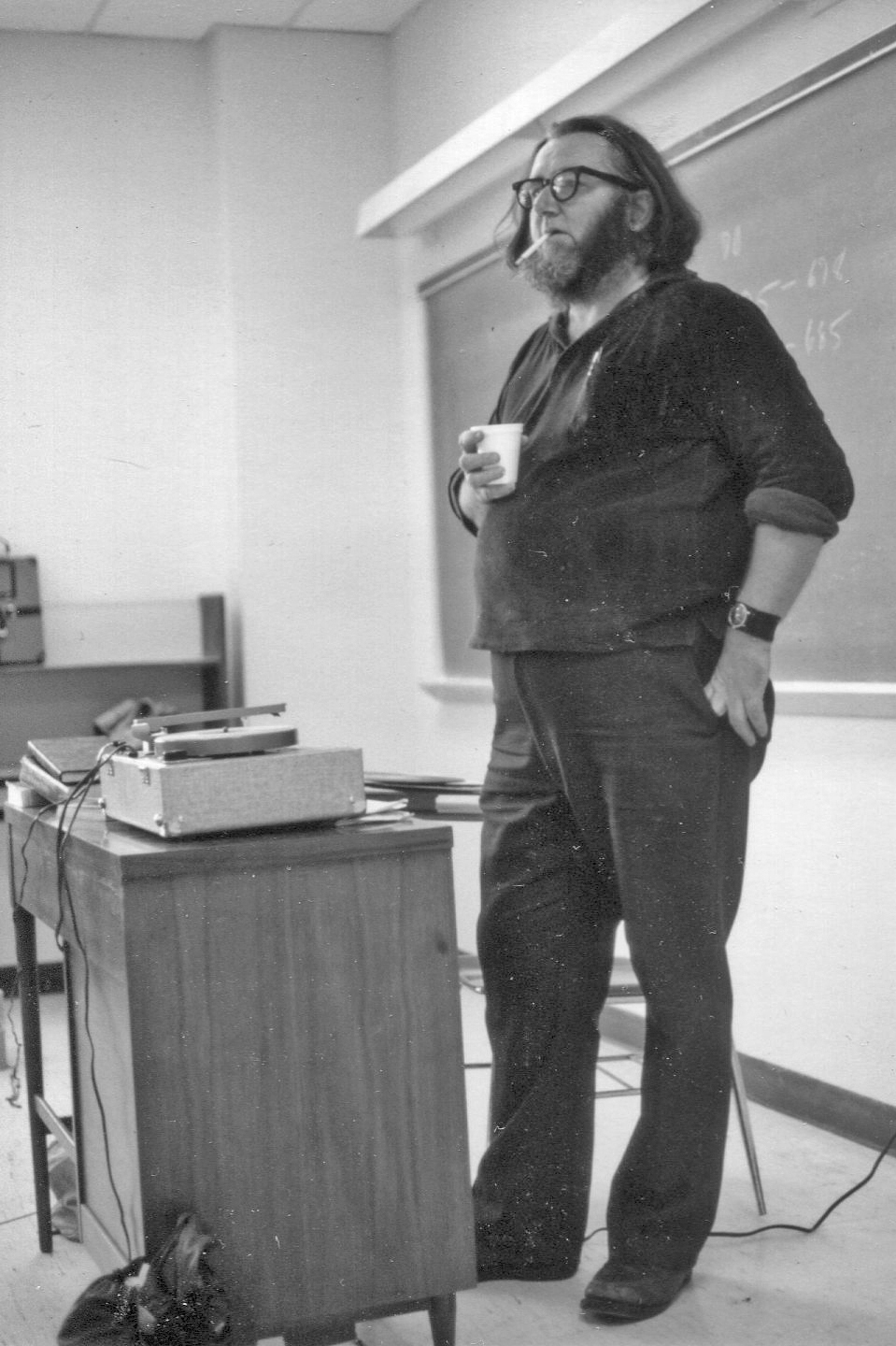
TED
BERRIGAN TEACHING | EF: Certainly. RC: And that there are
governmental whistleblowers who have stated that the real purpose of it all is
to control people through threats of embarrassment. EF: Yes, sure. Are we
being watched on the Internet? Like us all, I live in fear of saying things on
the Internet that are going to be, perhaps, picked up somewhere else and misread.
To be sure, they don’t care about me, or you, or any of us little people. But
still, there’s a Big Brother presence around us all the time. Yet, I don’t think
every one quite knows that, although they are afraid. We live in a time of fear,
afraid we might be seen, although in fact there is nothing worth seeing. I’ll give you a little
anecdote here which is kind of interesting. In the early Nineties, I invited Bill
Burroughs to Stevens. I just wanted to see what would happen. [Laughs] And so,
he came over. He had this presence of being like a Wall Street banker, or something
like that. RC: You mean with his
persona: his iconic suit, tie, and fedora. EF: Yes, the suit and
tie, everything. But he understood as well as anyone how controlled we are by
the powers that be. So, I brought him in, and I just wanted to observe this. Then
I introduced him: “This is William S. Burroughs, grandson of the inventor of the
Burroughs adding machine.” [Laughs] Afterward, we had a reading, and, of course,
many people couldn’t make any sense of it. He did his Dr. Benway thing,
and he did it in a typical, you know … I can’t, right at this moment, imitate
that attitude … RC: With that very dry,
Midwestern drawl. EF: Exactly. I just sat
at the back of the room and enjoyed every moment of it. But there was fear, because
I don’t think they understood, so instead there was fear. Because he was saying
what we should know. And this was before the Internet made it much worse. RC: You write “My debt
to Ted Berrigan is too great to be expressed; in a very real way, he changed everything.”
Maybe you could talk about this and about how you first got to know Ted. EF: I went to Columbia,
and a year ahead of me was Ron Padgett, who was Ted’s closest friend. And, because
of that, Ted was around from time to time. So, I certainly knew who he was, but
I didn’t really know him in any personal or deep way. Then, many years later,
I went through a really bad spell. I drank horrendously and so forth. At one point,
I simply collapsed on Broadway. I had to get out, and that was why I got shipped
off to Turkey, the first time. I come back, and I’m in
basically the same state. You know, I’m not like other people; I don’t think this
way; these are not my values. Very troubling. Deeply, deeply. And then, the school
gets a grant to hire a distinguished professor, and my boss comes to me and says,
“Can you find us a distinguished professor?” So I call Allen Ginsberg and leave
a message: “We’re looking for a distinguished professor,” hoping that he’ll say
yes. I come in one morning,
and the secretary has a message that an “Ellen Ginzberg” has left a message. I
don’t know any Ellen Ginzberg. All right, so I call. “Oh, it’s Allen Ginsberg.”
And he recommends Gregory Corso. Well, as our distinguished professor …
[Laughs] A wonderful poet, but maybe not the best suggestion. Then he says,
“No” – because I hesitate, of course – and says: “Ted Berrigan.” Ted is giving a reading,
and Joel Lewis is there, and I go. After the reading, I approach Ted and say,
“Would you like to be a distinguished professor at my college?” [Laughs] In a
very Ted fashion, he screws up his lips and he says, [imitating Ted]: “Yeah. I
think I’d like to do that.” And so, he does. We had adjoining offices,
and Ted really changed my life at that particular point. He made things that I
found intolerable, tolerable. We became the “Ted and Ed” show. We became very,
very close. Very close. And then there was his wife Alice Notley, who became one
of my angels, and my wife Elaine liked her very, very much. Their children, Edmund
and Anselm, were the same age as my kids, or within a year of each other, and
they all became friends. And things worked from there. At that time we had a
farm in Cummington, Massachusetts, and Ted and Alice and Anselm and Edmund came
up for a visit. So, everything goes very fine. And Ted just tells me how I can
get around having to be professorial. How you can do your job and still be yourself.
It was just a human thing: going to spend time in his apartment, and living, and
their kids came over, because we had a place in Hoboken at that time. It was just
such a very good thing. Also, through “Ted and Ed” I met Simon Pettet, who became
another angel to me, and so many others.
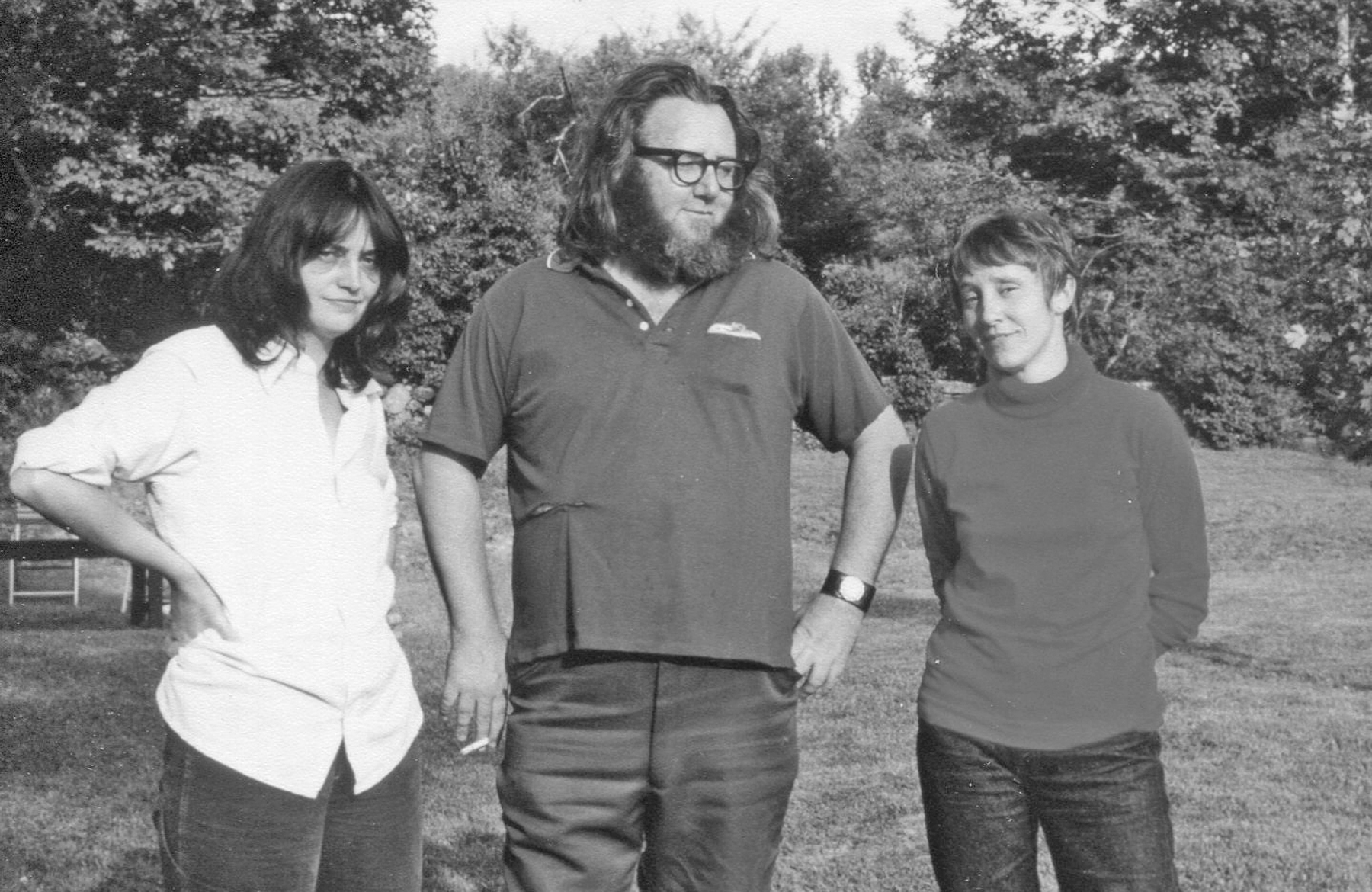
ALICE
NOTLEY, TED BERRIGAN, AND ELAINE | Well, it’s hard to pin
down. What you need is examples, and it’s more of a flowing kind of thing that
Ted showed: how you can live in this world, and do your job, and pay the rent,
and do the things that are expected of you, and still be yourself and write poems,
which is the most important thing in the world. Until this time, I wrote and I
destroyed, and destroyed, and destroyed my work. It was a necessary thing to do,
a secret, but, on the other hand, I just couldn’t go on any more. One of the things that
Ted believed – and I’ve come to believe this very much – is that, if you’re a
poet, you have to help other poets. You have to, because nobody else is going
to do it, not in this world. Unless you want to be, oh, I don’t know, one of those
people that get reviewed in the Times or win prizes. Or be some kind of
“artfuck.” Anyway, how are we going to help? Ted’s answer was, basically, to teach.
And he was always teaching. He had a very bad back,
so he had a mattress on the floor in his apartment, and he would lie there and
read manuscripts. He would talk to people and suggest, you know, how they might
be able to do this better with the language and so forth. He had no money, so
he didn’t have the resources; but, as a teacher, he had this ability to read,
criticize, and help people. One time, he suggested
that we would do a magazine. And we played with that idea. So, I think it’s 1984
now, and he and Alice and Anselm and Edmund are planning to come up to Cummington,
to our farm for a while. It’s the Fourth of July, and Simon calls, and he says,
“Ted just passed away.” And oh, my God, it is devastating. The magazine didn’t happen
at that time. Next year, we went back to Turkey. We’re coming home on the plane,
and I’m thinking: Well, in Ted’s memory, I’ll do the magazine. So that’s where Talisman
begins. The first issue was devoted to Alice. And things have kind of developed
from there. And then, books. Alice’s book was the first Talisman book, too. The
magazine was begun in 1986, and the issue came out in spring of ’87. Then I started
doing Bill Bronk’s book, and Bill is among the greatest of his time and my friend. RC: How did you meet Ginsberg,
and what was your friendship like? EF: Where did I meet him?
Was it through Ted? Simon? Anne Waldman? I don’t know; that goes way back. Remember,
the reason I went to Columbia was because that was where Kerouac and Ginsberg
had been. And Ginsberg was a presence. He’d lived in the dormitories, and
there’s a square in front of Hamilton Hall, and it was not unusual to see him
there. I could only describe
myself as a kind of groupie. He came back, and people knew him, and he would always
have this throng. And I was happy to be in that throng. So, “groupie” really is
the word. But knowing him? I don’t know; it’s just something that happened. But
everybody knew Allen; there was nothing special about that. He was the most generous,
open, and helpful of people. For example, I wanted
to go to an NEA summer school, and Allen writes this fantastic letter of
praise – totally untrue, I’m sure! I wanted to take a summer course with M. L.
Rosenthal. Do you know his work? Very un-Ginsberg, completely so! [Laughs] And I recall that, when
I went out to Naropa to teach, Allen knocked on the door just moments after I
arrived and took me to the local grocery store to buy supplies – but only organic!
– and chided me when I chose a tomato that didn’t meet that standard! RC: I met Anne Waldman’s
personal assistant in the late 1990s, in Paris. And he said that, just before
Allen died, Allen was calling everyone in his phone book, to ask if they needed
money. EF: I’m not surprised;
that’s the way he was. I mean, Ted’s idea that, if you are a poet, you help other
poets … I think Allen was, rather than “Me, me, me, my poetry, my
book, me, look at me!” no, Allen was always looking at you.
And trying to see what he could do for you. He was a remarkable person. I remember once, Allen
wanted to attend a faculty meeting at my school. He was just curious: “What’s
a faculty meeting like?” “Allen, they’re boring. Like all meetings, they’re terribly
boring!” But he insisted, and he came over with Ted. So, I introduced him to the
then president, who introduced him to rest of the people there: “We’re very honored
today, the great poet, Allen Ginsberg, is here with us,” and so on. And then,
we go into business, the business of the meeting. Allen falls asleep. Instantly.
That’s the best thing you could possibly make of any meeting anywhere at any time
– just fall asleep! Meetings are inhuman; they’re awful. In the seven or eight
years that I was the director for the humanities and social sciences at my school,
I never held a meeting. Not one.
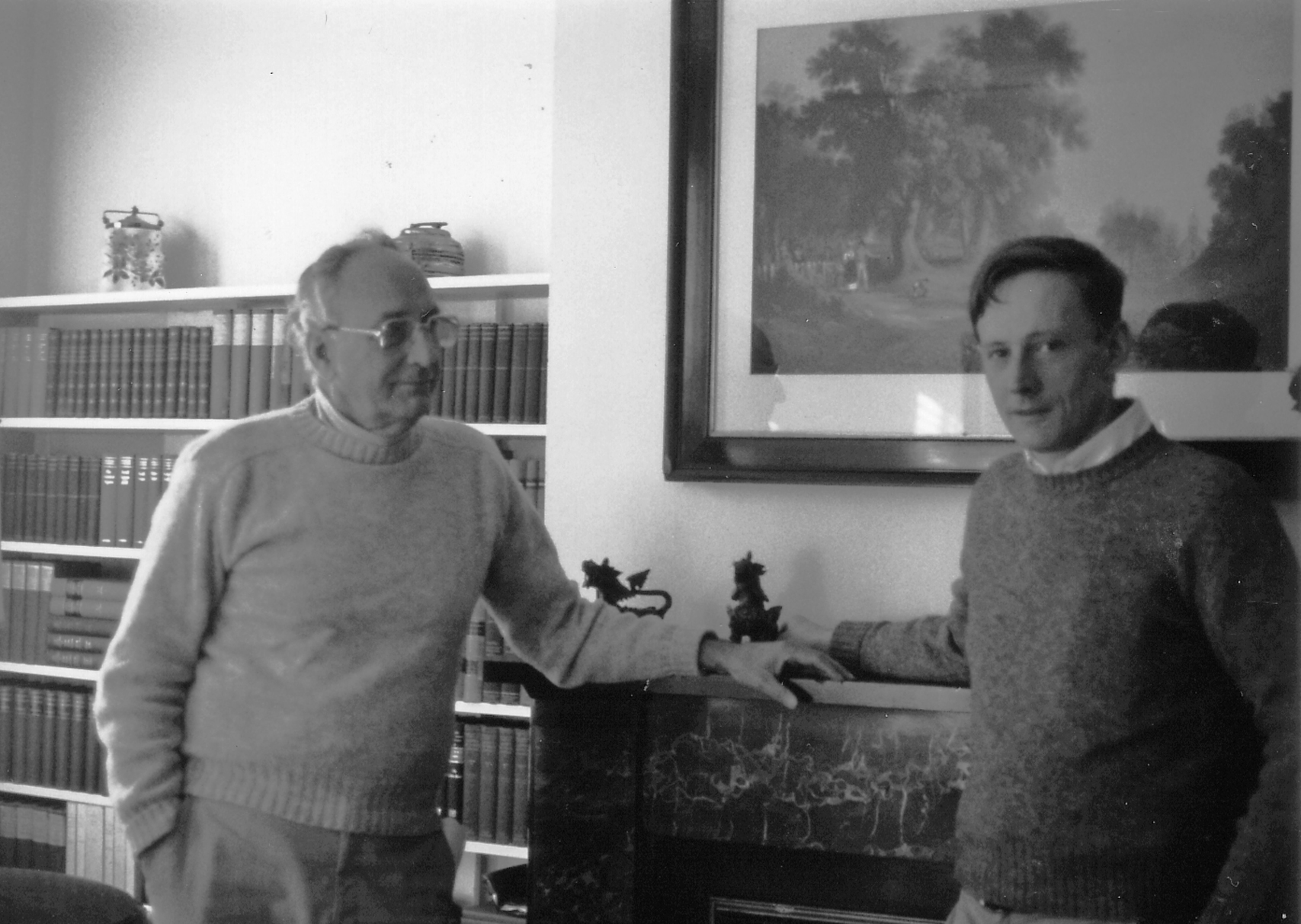
ED
FOSTER AND WILLIAM BRONK | RC: Another poet that
you were tremendously grateful to have as a friend was William Bronk. EF: William Bronk was
immensely important to me, and he was the key to so much. Some have argued that
there’s a line from his work to mine, but that’s false, as he himself has said.
But he confirmed notions about writing poetry that were critical to me and spoke
well of my work, something he did for few. This was exceptionally important to
me when I was younger. He was my father poet. I thought of him that way, and he
knew I did. We were intimate. A point he often made
was that he might write a poem and find that it said something he didn’t feel
he wanted to say. So he would leave the work for a few days, then return, finding
that the poem said what it should. Poems, in short, are not the result of intentions.
They find their form and expression with your words, but it is not you
who speaks. This is not unlike Spicer’s claim that poems come from East Mars. There were true parallels
between Bronk and myself, despite our difference in age. We both had profoundly
important, essential relations with women whom we loved deeply, but we were unmistakably
homosexual. Which, like poems, is not something you choose; it chooses you. We
talked much about that. In a letter to a friend
in the 1950s, when homophobia was at its height, Bronk discussed his homosexuality.
His biographer, Lyman Gilmore, records this, concluding: “Finally, and most significantly,
Bronk declares that his homosexuality is central to all his writing and thought.”
Bronk wrote: “Everything I write is about what I have written here. But I have
not before written it in this direct way and hardly ever thought it in words though
I am thinking it all the time.” Bronk is among the great
masters of American poetry in the second half of the twentieth century, up there
with Creeley (whom he liked) and Duncan (whom he did not). After years of friendship,
I became Bronk’s publisher, and I continue to be his publisher today. I attribute
Talisman’s success in large part to Bronk, for writers know that it is an honor
to have their books beside his. RC: Your poetry books include photographs that play an important
part in your work. How does being a gnostic poet affect what you do with a camera?
I’m wondering about your creative process in regards to photography. EF: You’re right: the photos, like the poems, are not intentional;
they’re not “about” their respective subjects. The photos, like the poems, very
obviously depend on formal conventions, but they always go far beyond that. I
wouldn’t allow them to be published otherwise. The photographer from whom I learned
much – this was back in my twenties or before – was Atget. RC: Regarding your poetry, how does your work and creative
process differ from that of Spicer and the other serial poets? EF: The Spicer folks were, several of them, deeply concerned with
language as such, with linguistics, as was Spicer himself. That was his academic
training, with a particular emphasis on Old Norse. Bloomfield, if I recall correctly,
was his master. But that does not touch on my interests or poetics, which have
more to do with music and sound. At one time, I seriously
thought about music as a destination, and I composed various works. They probably
weren’t very good, as I knew little about orchestration. My father had ambitions
as a concert pianist until he had to return home to support his parents during
the Depression. But he continued to practice, often holding me on his knee. When I was sent away to
school many years after he died, I found in my music teacher someone who seemed
to return me to the music world of my father. I was in eighth grade. This teacher
gave me the key to the music room at the school, where I could go after finishing
homework and listen to records of works by Orff, Brahms, and others who appealed
to me. The teacher encouraged my interest, and a few years later he introduced
me to the composer Alvin Etler. I met with Etler only once, but that was enough:
he, too, seemed to encourage my interests. And to be encouraged by an accomplished
composer like Etler meant a great deal. The late Fifties and early
Sixties were a time of intense homophobia. In one of the most tragic episodes
in the history of sexual persecutions in our country, a famous Smith College professor
and literary critic, Newton Arvin, was arrested and his diaries were seized. Among
those mentioned in the diaries was my music teacher. (This, by the way, is a famous
incident, the subject of a book, The Scarlet Professor, and a PBS documentary.
It’s now being used as the basis for an opera.) Everyone on the campus knew of
my gratitude to and great admiration for the music teacher. Call it devotion.
But this was a time when devotion could lead to other speculations, or so I thought,
and I know I was right. Survival depended on the closet. My obsession with music
as such ceased, but it merged with the obsession with poetry, and that is where
it is now. As you can see, this is
light years from Spicer. I have great admiration for the Spicer folks, but they
wrote in a different world. RC: You’ve published over
forty books, much of it poetry. How have your poems evolved over time?
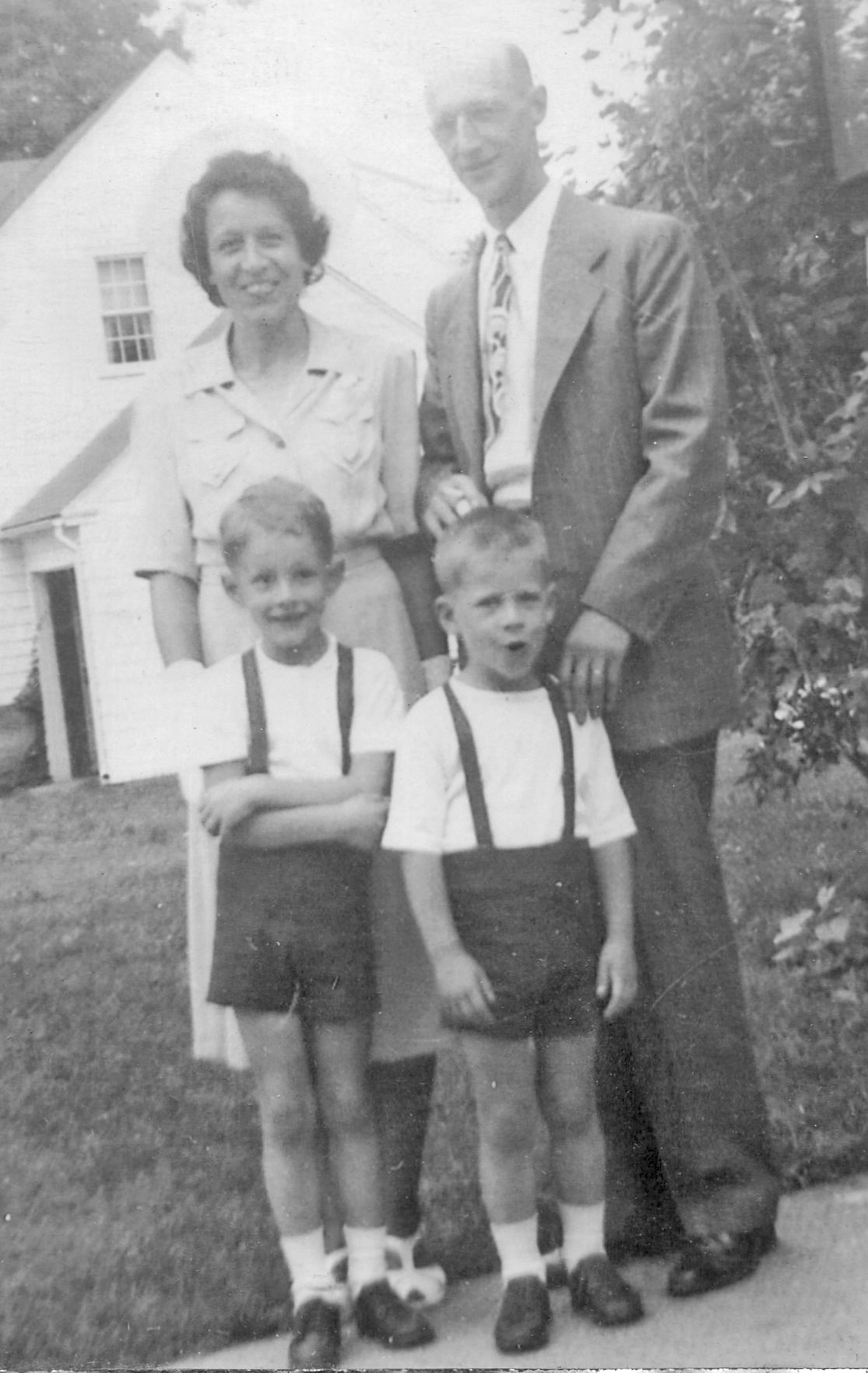
ED
FOSTER (BOTTOM LEFT) AND FAMILY, 1950 | EF: Oh, I don’t know …
RC: Even thematically?
EF: Oh, boy, I don’t know
how to answer that. RC: I get a great sense
of isolation in some of the poems, but there’s also a sense of being deeply connected
to what’s around you. Is some of the isolation that you portray the isolation
of the artist, that any artist goes through? EF: I’m just not sure
how to answer that question. Yes, I would say I’m a very isolated person. Maybe
this memory will help. OK, here we go: My father dies when I
am seven. He dies in the bedroom next to mine. I am actually under my bed writing
poems or verses. About Halloween, I think. Do you see what I’m saying? My mother
suddenly bursts out of their room, and says: “Your father is sick.” I am writing
poems. I go into their room, and he is dying. If you have not seen a person die,
I can tell you that it’s an awful thing to watch. And I’m a little kid; I’m a
seven-year-old little boy. Basically, somebody is leaving you. I mean, there’s
no way that you can talk about a “good” death. Even if it’s a gentle death, it’s
not good. And I’m a little boy, after all; I don’t know what is happening, but
I feel it. I remember: I go back,
and I stand on my bed, and I try to reach heaven, to ask God to stop this, because
I didn’t know what it is, but it is awful. And then, I can’t. Then I get back
under the bed, and I write poems. Maybe the memory here
tells more than if I gave just a critic’s answer. RC: Thank you so much,
Ed. ____________________
Photos of Ted Berrigan,
William Bronk, and Ed Foster Copyright © 2016 Edward Halsey Foster. |